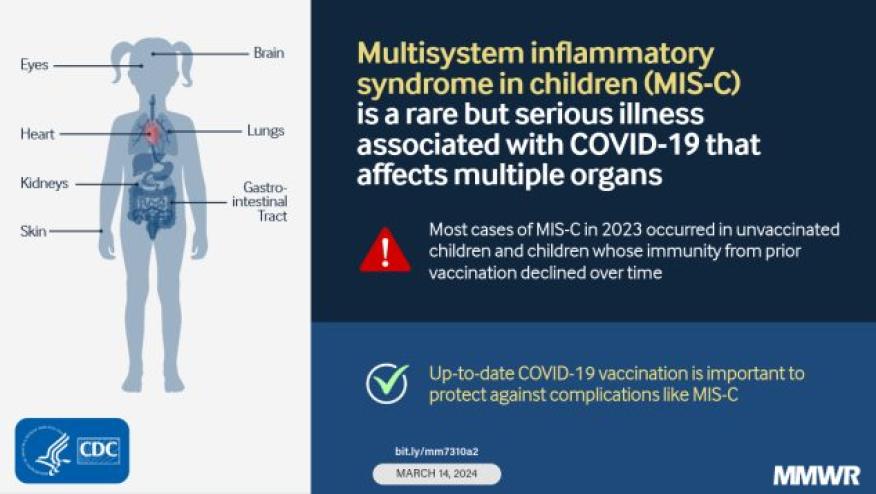MMWR: Vaccination and Multisystem Inflammatory Syndrome in Children Save

Multisystem inflammatory syndrome in children (MIS-C) is a rare but serious condition typically occurring 2–6 weeks after SARS-CoV-2 infection and characterized by fever and multiorgan involvement. The current MMWR report shows that MIS-C case numbers have decreased by 98% since 2021.
MIS-C incidence has decreased from early in the COVID-19 pandemic (highest in late 2020–early 2021), but cases continue to occur with a recent relative increase in the fall of 2023 after a period of increased COVID-19 activity in the general population. Among 117 patients with MIS-C in 2023, approximately one half required intensive care unit–level care. More than 80% (92 of 112) of MIS-C cases were in vaccine-eligible but unvaccinated children, and among the 20 vaccinated children, 60% likely had waned immunity at the time of MIS-C illness.
Multisystem inflammatory syndrome in children (MIS-C) is a rare but serious condition typically occurring 2–6 weeks after SARS-CoV-2 infection and characterized by fever and multiorgan involvement. In May 2020, CDC created an MIS-C case definition and established a passive national surveillance system for voluntary case reporting by state and local health departments. In 2022, CDC and the Council of State and Territorial Epidemiologists (CSTE) created a new surveillance case definition that went into effect on January 1, 2023. Approximately 87% of cases reported using the 2020 case definition also meet the 2023 case definition. This report describes 2023 MIS-C cases and compares them with cases reported earlier in the COVID-19 pandemic.
Among 117 MIS-C patients with illness onset in 2023, 31 (26%) had onset during August–October, after an increase in COVID-19 activity earlier in the summer; this finding represented a two-thirds increase in case counts compared with the 19 (16%) cases reported with onset during the preceding 3 months.** Overall MIS-C incidence in 2023 was 0.11 cases per million person-months (95% CI = 0.10–0.14), representing an 80% decline in incidence compared with that during April–December 2022 (0.56 cases per million person-months; 95% CI = 0.51–0.62), and a 98% decrease from the peak of 6.79 (95% CI = 6.56–7.03) early in the COVID-19 pandemic (October 2020–April 2021).
The median age of MIS-C patients with illness onset in 2023 was 7 years, whereas the median age during February 2020–January 2022 was 9 years, and during April–December 2022 was 5 years. A similar decline in MIS-C incidence and shift to a younger age group in 2022 was reported in England.
Among the 117 MIS-C patients with illness onset in 2023, 68 (58%) had no underlying medical conditions; 58 (50%) required intensive care unit (ICU)-level care, 40 (34%) experienced shock, and 31 (27%) experienced cardiac dysfunction. These prevalences are similar to published national MIS-C surveillance data for 2,116 cases reported during July 9, 2021–January 31, 2022 (52% requiring ICU-level care, 38% with shock, and 29% with cardiac dysfunction), and are improved compared with data for cases reported for the total 4,470 cases during the earliest part of the pandemic, from February 19, 2020–July 31, 2021 (63% requiring ICU-level care, 45% with shock, and 31% with cardiac dysfunction).
Three (3%) patients with MIS-C died in 2023. Although 112 (96%) patients were age-eligible for COVID-19 vaccination, only 20 (18%) had documented receipt of any COVID-19 vaccine. Among the 48 vaccine-eligible patients with underlying medical conditions, nine (19%) had documented receipt of any COVID-19 vaccine. Among the 20 patients who had received COVID-19 vaccination, 12 (60%) received their last dose >12 months before MIS-C onset.
MIS-C continues to occur, but at low rates compared with those observed early in the COVID-19 pandemic. MIS-C incidence has declined, a recent shift to cases in younger children has occurred, and clinical characteristics have evolved. The reported 2023 incidence is likely an underestimate because jurisdictional reporting of MIS-C cases with illness onset in 2023 is incomplete, and case counts and incidence might also be affected by the change in case definition that occurred that year.
Clinicians should recognize that MIS-C might occur, especially during and after periods of increased COVID-19 activity, and should be familiar with treatment guidelines. MIS-C patients with illness onset in 2023 were predominantly unvaccinated children and those whose vaccine-induced immunity had likely waned. COVID-19 vaccination remains an important tool for preventing MIS-C.
CDC recommends that all children aged ≥6 months stay up to date with COVID-19 vaccination to protect against serious COVID-19 illness and complications, including MIS-C.









If you are a health practitioner, you may Login/Register to comment.
Due to the nature of these comment forums, only health practitioners are allowed to comment at this time.